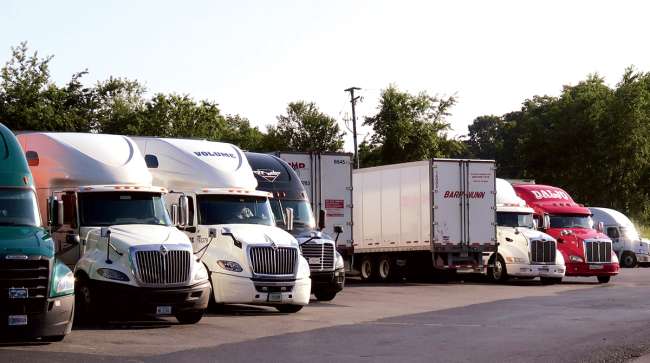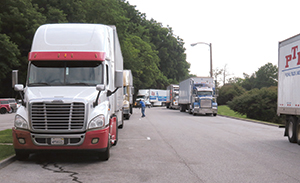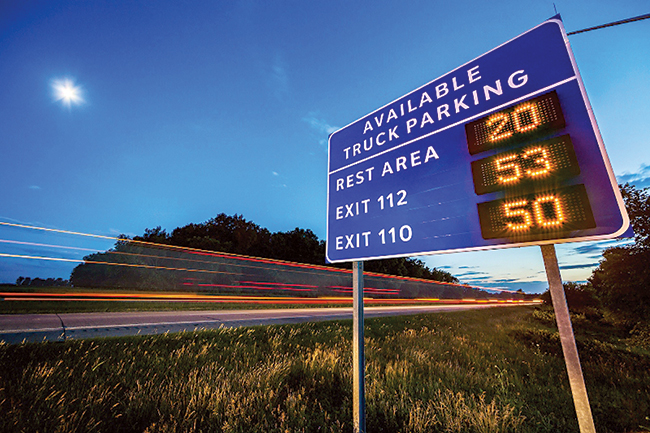Carriers Use Pre-Planning to Help Drivers Secure Truck Parking

[Stay on top of transportation news: Get TTNews in your inbox.]
The basic task of finding a safe and available place to park has become a top challenge for commercial truck drivers, but so far there has been no single solution to this persistent problem.
Trucking companies are addressing the parking shortage in multiple ways, including advance planning, using technology to access real-time information on parking availability, or even embracing paid reservations for parking spaces or hotel rooms to make it easier for drivers to shut down for the night.
“With parking being as big a factor as it is, a successful driver can no longer simply leave out on a trip and decide last-minute they are going to just pull in and park at a given location,” said Shawn Brown, vice president of safety for Cargo Transporters. “Careful planning needs to occur along with taking into account factors such as time of day, weather, traffic delays, etc., that all in some way affect how a trip will play out, and therefore how satisfied a driver is.”

Trucks parked at the Troutville Safety Rest Area on Virginia I-81. (Peggy Smith/Transport Topics)
Truck parking ranked third on the American Transportation Research Institute’s 2020 Top Industry Issues report, based on an annual survey of motor carriers, drivers and other trucking industry stakeholders.
Among drivers specifically, truck parking was the No. 1 concern.
“I think this peak in ranking is reflective of the continued frustration on the part of drivers who struggle to find a safe place to rest each day,” said ATRI President Rebecca Brewster.
Brewster said parking problems worsened in 2020 as some states temporarily closed their public rest areas due to the COVID-19 outbreak. In ATRI’s research, 44% of respondents said truck parking was “somewhat harder” or “much harder” to find once the pandemic started.
Some geographical locations, such as the Northeast and other heavily populated metro areas, pose a more significant challenge than others, Cargo Transporters’ Brown said.
“We also see the I-95 corridor from the Virginia-North Carolina line all the way south to nearly the South Carolina line before you come to adequate truck parking,” he said. “Many times, drivers will have ample drive time left on their clock, but due to this issue will have to take the opportunity to get parked early in the driving shift so as not to get stuck without parking when the driving hours are almost expired.”
Tim Chelette, a driver for Big G Express, said it can be hard to find parking after 5 p.m. in some areas.
“When you get closer to the larger cities, say Atlanta, you have to stop way back before you get there. After 4:30 or 5, you might as well hang it up when you get closer to the city,” he said.
There are times when Chelette said he could get to Nashville but has to stop 45 minutes outside of the city to park.
“I shorted myself 45 minutes, and I can’t get that back,” he said, adding that those miles add up over the course of a week.
Garth Pitzel, director of safety and driver development for Bison Transport, said some of the company’s drivers have changed their running habits in some areas, such as the East Coast.
To help drivers secure parking, Bison Transport aims to provide daily plans the previous night rather than in the morning.
“If drivers have that information earlier, they can plan their day,” Pitzel said. “In many cases, that can get the driver to the truck stop an hour earlier. That hour can make a big difference.”
Bison Transport, based in Winnipeg, Manitoba, ranks No. 56 on the Transport Topics Top 100 list of the largest for-hire carriers in North America.
Cargo Transporters encourages drivers to leave early and plan with parking in mind.
“If a driver runs an area of the country regularly, they are more likely to learn the ins and outs of an area which will help them know where adequate parking is located,” Brown said.
Brown said Cargo Transporters inquires with customers to see if parking is available on their premises upon loading or unloading and gathers information from drivers to help others make informed decisions.

A digital sign indicates available truck parking. (U.S. Department of Transportation)
Real-Time Parking Data
Technology also is playing a role in alleviating the truck parking shortage by providing real-time information on parking availability, whether through truck parking apps or variable message signs on the highway.
ATRI, American Trucking Associations and Natso, a trade group representing truck stop operators, formed the Truck Parking Leadership Initiative, which developed the Park My Truck app. That app enables truck stops, rest areas and others to report the number of spaces available in their lots.
Chelette said parking apps are helpful.
“Drivers can update them to say spots are limited or there are a few spots left,” he said. “It saves you time.”
Some apps, such as Trucker Path, crowdsource real-time parking information. Trucker Path features 8,000 locations where drivers can find available truck parking, and a network of 600,000 drivers provides real-time updates, the company said on its website.
Several truck stops, including large chains, allow drivers to reserve parking spaces for a fee.
However, Chelette said many drivers will pay only if it is absolutely necessary, and most fleets don’t cover the cost.
“If you have to pay every day of the week, your paycheck is cut quite a bit,” he said.
According to a 2016 truck-parking analysis conducted by ATRI, about 15% of drivers had truck parking reservation fees paid for by their company.
“The research noted that this could be a way to improve driver retention as it would mitigate the stress drivers experience trying to find safe parking,” Brewster said.
Bison Transport is among those fleets that reimburse drivers who need to use a paid space.
“If a driver has to pay for parking, that’s just the way it is,” Pitzel said. “Ultimately, first and foremost is ensuring the safety of our employees and contractors.”
ATRI’s research showed that drivers get frustrated seeing available parking go unused when the available free capacity is filled up, but no one used the paid parking reservation, Brewster said.
There are 3.5 million truck drivers in the U.S., but only 400,000 available parking spots. Drivers waste a lot of time looking for parking. We've launched our new TruckPark app to help #Truckers find safe, secure spots! To learn more, visit https://t.co/fjve9bBe62 #Trucking pic.twitter.com/thG2UQTXYU — TruckPark (@TruckParkinc) May 24, 2019
TruckPark Inc., a platform that connects drivers with real-time parking information, allows drivers or their fleets to pay to reserve a spot for a 12-hour window either in advance or on-demand. The company works with private enterprises that dedicate a certain number of spots to the app.
Using TruckPark’s technology, drivers can also book on-demand fuel delivery for anywhere other than truck stops.
“You could park at a hotel, rest stop or shipper and we’re going to dispatch a truck to you,” said Anthony Petitte, CEO of TruckPark.
State DOTs Join Forces
The challenge for drivers using truck parking apps is the restriction on the use of handheld technology while operating the truck, ATRI’s Brewster said. That’s where the real-time information delivered on variable message signs on the roadway comes into play, she said.
The Truck Parking Information and Management System initiative, led by the Mid America Association of State Transportation Officials, unites eight Midwestern states — Indiana, Iowa, Kansas, Kentucky, Michigan, Minnesota, Ohio and Wisconsin — in the nation’s first regional truck parking information management system that shares data along high-volume freight corridors.
The group received a $25 million federal grant, which requires all eight states to operate the system until January 2022, and the states anticipate extending operations, said Phil Mescher, transportation planner at the Iowa Department of Transportation.
As part of the TPIMS, 43 sites, including rest areas and truck stops, collect and share data using cameras, video analytics and wireless pucks embedded in the pavement to detect vehicles, Mescher said. To enhance accuracy, additional, remotely controlled cameras are used to check, verify and adjust the counts of available parking spaces twice daily if needed, he added.
“Given the information provided is nearly real-time, truck drivers can monitor parking locations for how many spaces are available and get an indication of how quickly they are filling up or exiting,” Mescher said.
That information is invaluable for drivers that otherwise would have found it risky to pass up available parking when running low on available driving time under the hours-of-service rules.
“Now they can know what is ahead of them and make better decisions on how much further they can drive before getting to a suitable parking location,” Mescher said.
A Different Approach
Carbon Express, a liquid bulk carrier based in Wharton, N.J., has found a different way to solve the parking problem.
The company pays for hotel rooms for its drivers, which means they don’t have any issues finding parking spaces.
Within 90 days of implementing the hotel policy, CEO Steve Rush said he saw a dramatic improvement in drivers’ attitudes. The company also has a high driver retention rate with turnover in the single digits.
“We have day cabs. That means we have a motel expense. It also gives us reasons to work things to get the driver home,” Rush said, adding that drivers’ needs haven’t changed since 1965. “They want the same thing now that they wanted back then. They want to get paid. They want to get treated respectfully and they want to go home.”
Want more news? Listen to today's daily briefing below or go here for more info:




